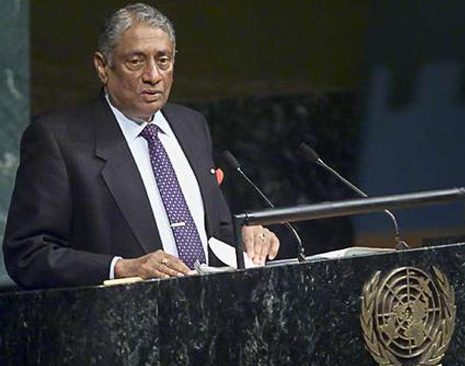Reading Time: 2 min read
Lakshman Kadirgamar was born in Colombo on 12 April 1932. He completed his secondary education at Trinity College, Kandy, where he excelled in academics and in a wide range of sports, including cricket, rugby, and athletics. In 1950, he studied law at the University of Ceylon and graduated with a Bachelor of Laws (LLB) degree in 1953.
Lakshman Kadirgamar passed the examinations of the Ceylon Law College with flying colours and was admitted to the Ceylon Bar in 1955. He later pursued his graduate studies at Balliol College at the University of Oxford, where he became President of the Oxford Union in 1959 and obtained a Bachelor of Letters (B.Litt.) in 1960.
The late Foreign Minister was an expert on commercial, industrial, labour, property, and international law. He pursued legal practice both in Sri Lanka and the UK and was appointed to the President’s Counsel in 1991. Along his successful path to an eminent political career, he also served as a Consultant at the International Labour Organization in Geneva, and as Director of the Asia-Pacific region at the World Intellectual Property Organization.
One of his most notable achievements as a lawyer was when he became the first-ever person to conduct a formal investigation of a country on behalf of Amnesty International when he investigated the insurgence of Buddhist-Catholic violence in Vietnam in 1973.
The lawyer, scholar, and statesman began his political career at the age of 62, when he was appointed Minister of Foreign Affairs in 1994 by President Chandrika Kumaratunga. He served in this capacity until 2001 and then again from 2004, until his assassination in 2005. He was also appointed Chairman of the Council of Ministers of the South Asian Association of Regional Cooperation from 1998 to 2001, and as the Chairman of the Rim Association for Regional Cooperation from 2003 to 2005.
Minister Kadirgamar maintained strong relations with international governments that were important to Sri Lanka, especially India, China, the US, and the UK. Prior to his untimely death, he released an academic journal called International Relations in a Globalizing World, which was a key part of his long-term plan to make a significant contribution to Sri Lanka’s international diplomacy.
Lakshman Kadirgamar was posthumously awarded Sri Lanka’s highest honorary title, Sri Lankabhimanya, by the state for his successful contributions.

“
Peace is not going to be manufactured instantly. Peace is a long road and a hard process.
— Late Hon. Lakshman Kadirgamar